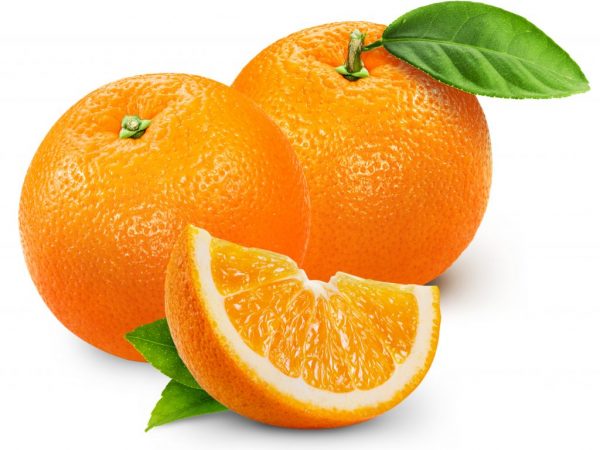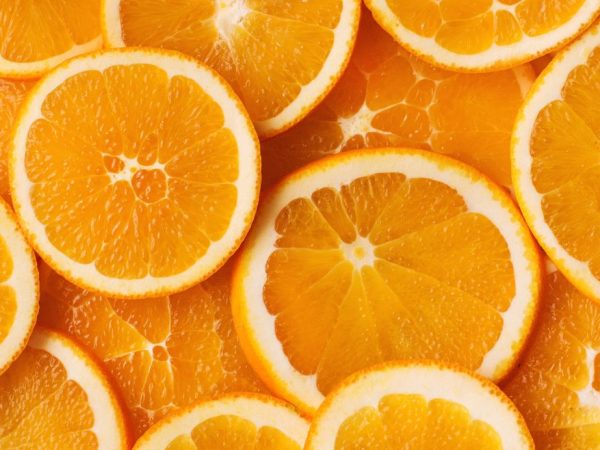Vitamin content in orange
Citrus fruits are considered beneficial for the human body, due to the huge amount of substances they contain. In case of a cold, they drink tea with vitamin lemon, and few know what vitamins are contained in an orange. This fruit is rich in them no less than lemon.

Vitamin content in orange
Vitamin complex
The vitamin composition of an orange is similar to that of a lemon or tangerine, since they are all citrus fruits. Only the concentration of substances differs.
Vitamins contained in an orange:
- AND;
- IN 1;
- IN 2;
- IN 3;
- AT 5;
- AT 6;
- AT 9;
- group PP;
- FROM;
- E.
Despite the fact that the benefits of the fetus are invaluable, there are also the dangers of overeating. Orange pulp causes allergies, heartburn, and deteriorates tooth enamel. Children and pregnant women need to carefully eat the fruit.
The benefits of vitamins in citrus
When you want an orange or other acidic product, the body replenishes the lack of vitamin C. For prevention, it is useful to use ascorbic acid.
It also signals low stomach acidity or food poisoning (the acid in citrus fruits neutralizes toxins). Orange pulp or juice can relieve pregnancy toxicosis.
What are the benefits of different groups of nutrients in the fruit:
- A: improves vision, regulates the internal and external state of the body (hair, nails, skin).
- Group B: improves the functioning of nerve cells, conduction; participates in the formation of blood cells; promotes good blood circulation.
- C: stimulates the immune system, improves metabolism, removes toxins.
- PP group: participates in redox processes.
- E: slows down the aging process, strengthens blood vessels. Helps to dissolve blood clots. Increases the absorption of vitamin A.
Minerals
Minerals and trace elements are considered equally important. The pulp of the fruit contains the following substances:
- potassium;
- calcium;
- phosphorus;
- magnesium;
- sodium;
- sulfur;
- iron;
- zinc.
In terms of calcium content, oranges are leaders among citrus fruits: 100 g of pulp contains 197 mg of the substance. Calcium promotes nail growth and strong bones. For assimilation, vitamin K is needed, which is also found in kiwi, avocado, bananas.

The pulp of the fruit contains many useful trace elements
Potassium is good for blood vessels, cleanses the gastrointestinal tract, helping to remove toxins. This element destroys alcohol, nicotine and sugar. People who smoke are advised to eat citrus fruits a day to make up for the lack of substance.
Orange pulp is beneficial for people in depression, stressful situations, with a loss of strength and drowsiness.
In addition to minerals, the fruit contains:
- phytoncides;
- biflavonoids;
- folic acid;
- tartaric acid;
- pectin.
Phytoncides have antibacterial and antimicrobial effects. Biflavonoids improve cell growth and block cancer cells. Folic acid is good for women of reproductive age, pectin is good for digestion.
Tartaric (aka tartaric) acid has a beneficial effect on the skin, helps to exfoliate and moisturize it.
Ascorbic acid is considered the main advantage of the fruit.Only 150 g of orange provide a person with a daily intake of this substance. This amount of pulp contains about 70 g. Lack of acid leads to scurvy. The body does not synthesize the substance on its own, so it must be obtained from the outside.
Vitamins in orange work in combination, having a beneficial effect on the body.
Pulp composition
Orange pulp contains (per 100 g):
- proteins - 0.9 g.
- fats - 0.2 g.
- carbohydrates - 10.3 g.
- fiber - 1.4 g.
- pectin - 0.6 g.
- organic acids - 1.3 g
- ash - 0.5 g.
The rest of the weight is taken up by water. There are 40 kcal per 100 g of citrus.
The composition of the zest
The peel of the fruit contains many useful substances. Among them:
- sodium;
- fat;
- vitamin C;
- potassium.
Also, essential oil is obtained from the zest, which is used in cooking, cosmetology for skin and hair care. Tincture with citrus peel can ease painful periods. Decoctions on the crusts are used in the treatment of rheumatism and heart failure. Also, the peel is low in calories: 16 kcal per 100 g.
Conclusion
The content of nutrients in an orange is high. The pulp and peel contain vitamins, minerals, nutrients. In one middle fruit, the daily rate of ascorbic acid is located.
If the body lacks acidity or there is a likelihood of poisoning, you want sour. Vitamin C in orange stimulates immunity and improves mood during stress. Tinctures and decoctions with zest are used in cosmetology and folk medicine.


